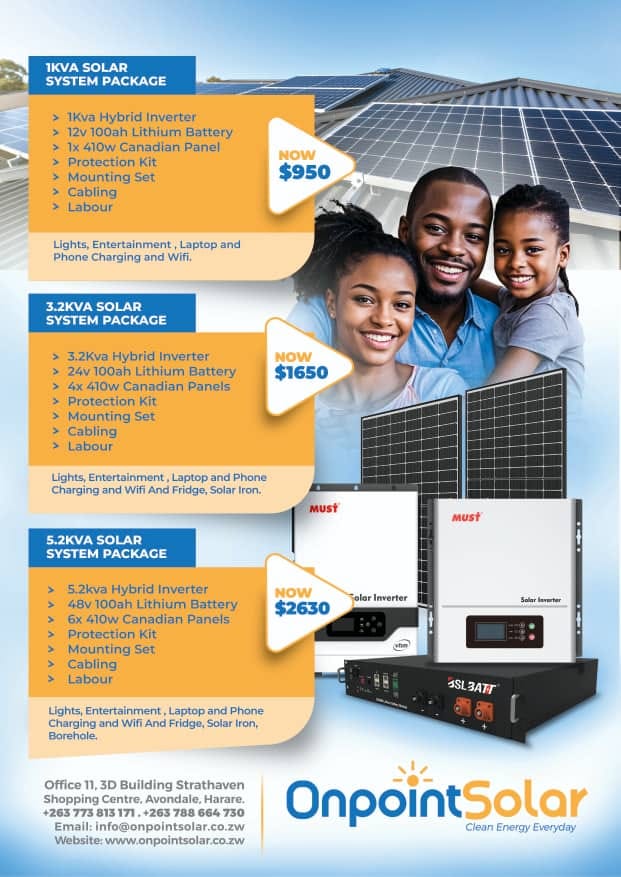Powering Zimbabwe: A Comprehensive Guide to Solar System Packages in Zimbabwe (1kva, 3kva, 5kva, & 10kva)
Are you looking for a solar system packages in Harare or Zimbabwe? Call 0773813171 for affordable and reliable solar systems in Zimbabwe

Zimbabwe, like many developing nations, faces significant challenges with its electricity grid. Load shedding, unreliable supply, and escalating electricity costs are common occurrences, disrupting homes, businesses, and the overall economy. Fortunately, solar power presents a viable and increasingly accessible solution. This comprehensive guide explores solar system packages available in Zimbabwe, specifically focusing on 1kva, 3kva, 5kva, and 10kva systems, helping you understand your options and make an informed decision.
Understanding KVA Ratings:
Before diving into the specifics of each package, it’s crucial to understand the meaning of “kva.” KVA (kilovolt-ampere) represents the apparent power a system can deliver. It’s a measure of the total power the system can handle, encompassing both active power (kW – kilowatts, which is the usable power) and reactive power. A higher kva rating generally indicates a larger system capable of powering more appliances. However, the actual usable power will always be slightly less than the kva rating due to conversion losses.
1kva Solar System Package:
A 1kva solar system is typically suitable for powering a small number of essential appliances in a home or small business. It’s ideal for situations where electricity demands are low. This package usually includes:
 Solar Panels: One to two small-capacity solar panels (around 250-300W each).
Solar Panels: One to two small-capacity solar panels (around 250-300W each).
Charge Controller: A device that regulates the flow of electricity from the solar panels to the battery.
Battery: A single deep-cycle battery, providing storage for nighttime or cloudy-day use. The battery capacity will depend on your energy needs.
Inverter: Converts the DC (direct current) electricity from the battery to AC (alternating current) electricity usable by household appliances. This might be a small, pure sine wave inverter for better compatibility with sensitive electronics.
Ideal Applications: A 1KVA solar system powers Lighting (LEDs), charges small electronics (phones, laptops) and runs a small TV or radio.
Limitations: Cannot power larger appliances like refrigerators, microwaves, or air conditioners. May require careful energy management to avoid depleting the battery.
3kva Solar System Package:
A 3kva system offers a significant upgrade in power capacity. It’s suitable for powering a wider range of appliances in a medium-sized home or a small office. This package typically includes:
Solar Panels: Three to four solar panels (around 300-450W each).
Charge Controller: A more robust charge controller capable of handling higher currents.
Battery: Multiple deep-cycle batteries in series or parallel configuration, providing increased storage capacity. The battery bank size will significantly impact the system’s performance.
Inverter: A more powerful inverter, ideally a pure sine wave inverter to support a greater range of appliances and sensitive electronics.
Ideal Applications: Solar system runs 1 x Refrigerator, lighting, charging multiple devices, a small microwave, a TV, and some other small appliances simultaneously.
Limitations: May not be sufficient for running energy-intensive appliances like air conditioners or electric water heaters continuously.
5kva Solar System Package Zimbabwe:
A 5kva system provides substantial power for larger homes or small businesses with moderate energy needs. This system usually includes:
Solar Panels: Five to seven solar panels (around 350-400W each).
Charge Controller: A high-capacity charge controller, possibly MPPT (Maximum Power Point Tracking) for optimal energy harvesting.
Battery: A larger battery bank comprising several deep-cycle batteries.
Inverter: A powerful, pure sine wave inverter capable of handling the higher power demands.
Ideal Applications: 2 x Refrigerators, Lighting, multiple electronics, microwave, TV, air conditioner (depending on size), water pump, and other household appliances.
Limitations: May still struggle with very high energy demands, particularly during peak usage. Consider adding more batteries for extended operation during periods of low sunlight.
10kva Solar System Package:
A 10kva system is ideal for larger homes, businesses, or even small farms with significant power requirements. This package represents a substantial investment but offers a considerable increase in capacity and reliability. This package will include:
Solar Panels: Eight to twelve or more high-capacity solar panels (around 400-500W or higher).
Charge Controller: Multiple high-capacity MPPT charge controllers, often in parallel to handle the high currents generated by the numerous solar panels.
Battery: A large, potentially multiple-bank battery system providing significant storage capacity.
Inverter: A very powerful pure sine wave inverter, potentially split-phase for better compatibility with various appliances and distribution within the home or business.
Ideal Applications: Large homes with numerous appliances, businesses requiring considerable power, agricultural operations requiring irrigation pumps or other high-power equipment.
Factors to Consider When Choosing a Solar System Package:
Energy Consumption: Assess your daily energy needs by listing your appliances and their power ratings (Watts).
Budget: Solar systems represent a significant investment. Consider financing options if needed.
Roof Space: The available roof space will determine the number of solar panels you can install.
Sunlight Availability: Zimbabwe generally enjoys abundant sunshine, but regional variations exist.
Professional Installation: Always choose a reputable installer experienced with solar systems.
Conclusion:
Selecting the appropriate solar system package for your needs in Zimbabwe requires careful consideration of your energy requirements and budget. This guide provides a foundational understanding of 1kva, 3kva, 5kva, and 10kva systems, but consulting with a qualified solar installer is crucial to determine the best system for your specific circumstances. Investing in solar power offers a pathway to energy independence, reliability, and cost savings in the long run, contributing to a more sustainable future for Zimbabwe. Remember to compare quotes from multiple installers before making a final decision. Investing in a quality system from a reputable installer will ensure years of reliable, clean energy.

